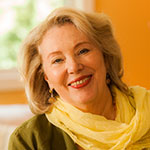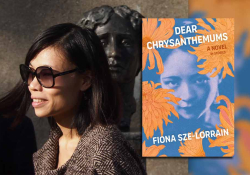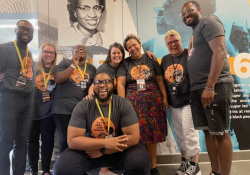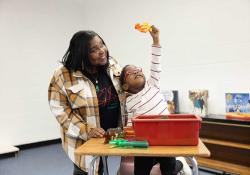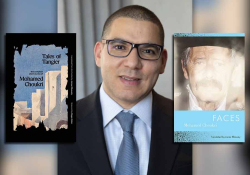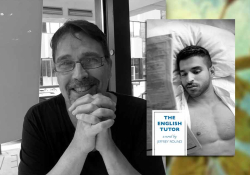The “Cultural Practice” of Stephanie Pacheco: A Conversation with the 2024 National Youth Poet Laureate
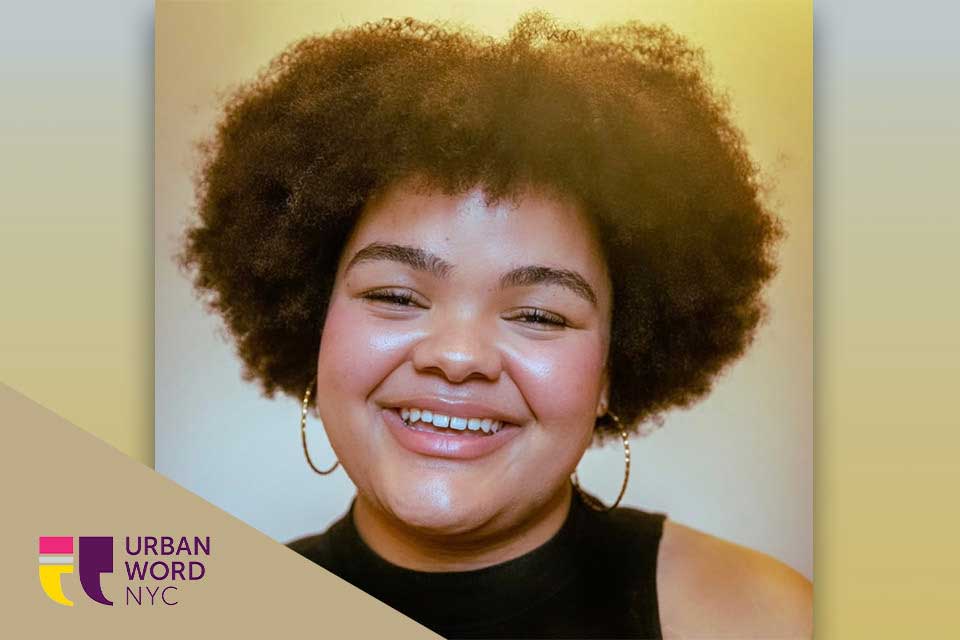
On April 20, 2024, Stephanie Pacheco was named the 2024 National Youth Poet Laureate, the eighth person to hold that title. A fierce advocate for educational equity and social justice, she was the New York City Poet Laureate from 2022 to 2024 and the inaugural New York State Poet Laureate from 2023 to 2024. Pacheco began performing her poetry as a young high school student and has been welcomed at venues that include the Apollo Theatre and the Schomburg Center in New York City. She has been featured on the Today Show, National Public Radio, the Daily News, CBS, Fox News, and in the New York Times. Pacheco is currently a writing and literature major at the Borough of Manhattan Community College and looking forward to continuing her education this fall at a university. Though she has not yet decided where that will be, she is confident that she is ready: “No matter where I go or what I do, I know that I’ll always be rooted in storytelling and care for my community, so I’ll hold onto that wherever the wind blows.”
The Youth Poet Laureate program is sponsored by Urban Word, a nonprofit organization founded on a belief in the transformative power of the written and spoken word. They are committed to providing “young, creative voices, often those that are marginalized, the tools, training, and platforms to rewrite the narratives that shape their lives and their communities.” Headquartered in New York City, Urban Word sponsors programs for youth poetry and civic engagement at the local, state, and regional levels throughout the United States. The initiative began in 2008 and has over one hundred programs across the country.
Camea Davis, a current member of the research faculty at Georgia State University, is the national director of Urban Word’s YPL program. Dr. Davis describes the unique combination to “celebrate youth voices at the intersection of literary arts, civic engagement, and social impact.” During the 2024 commencement ceremony at the Kennedy Center in Washington, DC, Marc Bamuthi Joseph, vice president of social impact, stressed the importance of cultivating these young voices as “the next generation of linguistic possibility.” A poet himself, he praised them for their role in uplifting the public imagination with language “not just in terms of the literary continuum, but for the hopes of democracy in our country.”
This interview was conducted over Zoom and email in early May 2024.
Renee H. Shea: It’s been quite a ride the past few months, capped off with your becoming the 2024 Youth Poet Laureate. At the risk of asking you the question you’ve been asked countless times in the past few weeks, What does that mean to you?
Stephanie Pacheco: Being the National Youth Poet Laureate of the US is such an immense and incredible honor. I’m especially delighted to be able to represent the communities that I am part of. I’m still overjoyed and in awe of this moment.
Shea: You’ve been in demand and in the public eye for a while, but now you’re going the way of Amanda Gorman in terms of visibility! How did that Sprite commercial using your poem “Black Beauty Is Forever” come about?
Pacheco: I do a lot of work with Urban Word, a nonprofit literary organization that pours so much care and access into young people interested in poetry. Sprite was one of the groups that got into contact with Urban Word. They wanted a poem generally about beauty in Blackness—centering on young Black artists and our connection to our identity. So, I was able to write a poem and do the voiceover and have it paired with really cool visuals. It’s on Instagram and TikTok and some other social media.
Shea: I’d like to hear about how you got here—from the New York City laureate to state laureate to national. It’s a rigorous process with a lot of work, both to create and to present, and ongoing pressure. I’m curious about what kept you motivated.
I had to think about what brought me to poetry in the first place—it allows me to connect to people, to tell my story, to tell untold stories, and to build bridges between people.
Pacheco: That’s a really good question; it definitely has been a rigorous process at every level. I had to rise to the occasion, put a lot of care and attention into the process, and stay rooted. I had to think about what brought me to poetry in the first place—it allows me to connect to people, to tell my story, to tell untold stories, and to build bridges between people. So, when I am putting in an application for a challenging competition, I have to remember why I even love the art form in the first place.
That was not difficult to do when I was surrounded by a community like Urban Word, a legacy of artists who are so invested in the art form that I was always being met with this renewed passion. They supported and helped me through every step. Being reminded of my purpose and then being surrounded by these amazing people kept me motivated.
Shea: Your work is firmly grounded in a specific place—the Bronx, NYC. There’s your trademark poem “Yo, Steph! Where You From?” with the lines: “i say i’m from New York / and i mean / i’ve been going to the same braiding shop on Fordham Ave / since i was 11, i found the rhythm / of fingers twirling / my hair into soil and blossom / and named it my favorite beat.” In “Sisterhood,” you declare, “it took more than a village to raise me / it took a whole neighborhood.” Do you think this local emphasis might change now that you have a national platform?
Pacheco: I definitely started writing about my neighborhood because it’s what’s around me, but the things I’ve learned from living in New York and growing up in the Bronx are things that can be translated all across the country. I hope to take my lived experience here and connect with people from all over. My writing kind of sprouted here, where I’m from, but I look forward to having it blossom much further.
Shea: I read that the process to compete for this honor included a written portfolio of your work as well as a record of your social justice advocacy. In one article, you said that it was your community connection and social activism that introduced you to poetry. I would have thought it was the other way around, so I’m intrigued by how activism led to poetry for you.
Pacheco: They’re definitely intertwined; they do a little dance with each other. In high school I was doing a lot of student organizing because my interest began with educational justice. Growing up in NYC, I saw how some schools don’t have as many resources as others. Seeing those disparities gave me something to fight for. I wanted to live in a city where every school was abundant in resources, where students had everything they needed to be successful in school and therefore in life. Ever since I was fifteen, I’ve been putting together different community events, in town halls, and doing the grassroots organizing to fight for schools that were not fully funded. Somewhere in that I had to realize the importance of my story —of being a Black Latinx student from the south Bronx going to school in Harlem. There was value in what I had to say and what experiences I had, coming into this world of advocacy.
From there, I knew I had to say something to my community, to these people who are looking to get riled up for educational justice. At that point, I had been creatively writing for some time in school assignments that had piqued my interest and brought me joy. But when I got into organizing activism, I felt, This is something I have to do. I had to tell my story. I had to lend my voice to this cause because it’s vital; it’s going to speak these changes into existence. That’s when I met poetry as a tool for social activism. I would perform my poetry at local events for social justice that I would also help put together. I think the audience looked forward to poets and poetry to reignite their hearts to be realigned with their mission. In addition to being a calling, it became a responsibility, and I’ve stuck with that since. Social activism and poetry definitely dance together.
When I got into organizing activism, I felt, This is something I have to do. I had to lend my voice to this cause because it’s vital; it’s going to speak these changes into existence.
Shea: What’s your process? What gets you started? Do you start out writing … or speaking?
Pacheco: It depends. I feel like different stories take shape in different ways. There have been times where stories come alive through a free-write or a story comes together from something like a journal entry. Or I might be sitting in one of Urban Word’s writing workshops, going through other folks’ poems and doing some analysis. Really, I let the story guide me.
Shea: I’m curious about changes. I listened to as many of your poems as I could find online while I read the transcript. So, in “Where I’m From,” for instance, a printed copy I found referred to Cam’ron, but when you read it on the local television station after you were named national laureate, you changed it to Santana. So, do you keep “revising” or improvising when you perform your work?
Pacheco: That’s the fun part about writing and performing poetry. You can tweak and customize different things for different performances. Poems can be living documents. There might be a specific song I want my particular audience that day to know, but then I might switch it out. Poems can change and evolve and move as we do. Because why not?
Shea: You often talk about the importance of storytelling in your poetry. You won the 2024 James Tolan Student Writing award for both poetry and fiction at your college (poetry, “What I Have Learned,” and fiction, “While the Music Plays”). Is fiction a more recent interest—an extension of the storytelling you do in your poetry?
Pacheco: I’ve always enjoyed the act of writing, documenting a moment in time, jotting down my thoughts, and making sense of them on paper. Sometimes stories take shape as poems; the lines in the stories want to be broken up in stanzas and be told that way. Other times, the story takes shape as a fictional short story. The story I received the award for began as a little seed that I planted many years ago where I kind of had a story in my head that wasn’t a poem, but it was a story I still wanted to tell. It eventually took shape in fiction. I enjoy different types of writing. I’ve dabbled in playwriting and have thought about screenwriting. Writing can have many different shapes and forms, and that piques my interest. As I continue my career as a writer and performer, I look forward to embracing storytelling in all its many genres.
Shea: You’ve worked with the Healing-Centered Schools Task Force. What is that, and how have you participated?
Pacheco: It’s a local organization based here in the Bronx, actually in the district where I went to middle school. It’s a coalition of parents, educators, and students in the New York City public school system. We come together to advocate for more resources for greater access to what students need to be successful in a classroom setting. Specifically, it gets its name from the sorts of policies we advocate for. We believe that schools ought to think of their students as full humans, not just as individuals who come to sit in a classroom setting, but as people who need to be cared for. So “healing-centered schools” means making sure that students have emotional support, mental health support, access to food—everything they need to be well enough to show up for their education. It’s such a pleasure to organize and celebrate with them through my poetry.
Shea: One of your stated goals as national youth laureate was increasing access to art. Would you say that’s part of educational equity as well as education that is “healing centered”?
Pacheco: It’s all part of what comes with certain schools not having all the resources they need to give students access to many and various programs. I grew up going to schools that wanted to give us art, but they couldn’t. They didn’t have the funds, or had only limited funds, to bring creative writing, acting, music, and dance classes into schools so young people could be introduced to them and identify where their passions and callings lie and, if they choose, have a lifetime of feeding into these art forms.
Shea: Who are some of your most significant influences—other spoken-word poets or poets in general along with other literary figures from the present and past?
Pacheco: Let me gather my words. When I think about literary legacy, we have to talk about Patricia Smith, Nikki Giovanni, Sonia Sanchez, Audre Lorde. These women have set the foundation. Those women are people I look to for information, knowledge, thought, and a constant memory of who I am in literary lineage to. Right now, Mahogany L. Brown, Jive Poetic, and Jennifer Falú are some of the people who I’ve been in community with through Urban Word, people whose writing is out of this world and who inspire me. I know I spend a lot of time talking about Urban Word, but with reason!
When I think about literary legacy, we have to talk about Patricia Smith, Nikki Giovanni, Sonia Sanchez, Audre Lorde.
Shea: You dedicate your poem “On Surviving House Fires” to James Baldwin, and a repeated line is “Say that the fire next door / shall be the fire this time.” Why is he especially important to you, and how did you become acquainted with him?
Pacheco: There’s not much I can say about how much he has contributed to the world of literacy, advocacy, and social movement. I became familiar with Baldwin’s work through the lens of activism. He lends his artistry to the world of excellent literature and to very impactful social movements. He’s another incredible writer who we must talk about when we talk about writing in America and how it is has influenced social justice.
Shea: I’m going to go out on a limb here and ask a question that may sound skeptical, but I honestly don’t mean for it to! Your poetry—and spoken word in general, it seems to me—directly appeals to young people your age and maybe others in their twenties? So, I wonder how someone who is, say, in their fifties, or maybe even a Boomer, might learn to appreciate these important voices in our culture right now?
Pacheco: Though I am a young person, and there are many young people with whom my work may resonate, I think it’s a similar principle to the way that I know my story of growing up in New York City can translate everywhere. There are certain things you understand as a person—pains, joys—so I hope that’s something that translates in my poetry, that my story will resonate with people of all ages and all backgrounds.
Shea: Like the last lines of “Where I’m From”: “it is cultural practice / to refuse / to die.” That’s vintage universal.
Pacheco: That’s right.
Shea: When I watched the commencement ceremony at the Kennedy Center on April 20, I just loved that collaborative poem that you and the other finalists wrote and performed together. How did that come about? Do you feel a sense of community with other laureates?
Pacheco: Thank you, thank you. As a part of the National Youth Poet Laureate competition, we have the pleasure of being in this cohort with the other finalists. We take part in weekly workshops together, we work and write together, and we get to know one another under the mentorship of a phenomenal writer, in our case Jennifer Falú.
Part of being in that cohort is writing a piece together. It came about through us trying to find out what story we wanted to tell as a unit and where our experiences from all over the country met. For us, it meant taking pride in our identities, taking pride in the way that the people that we come from have survived for us to exist. That was our common ground. We wrote together, we wrote individually, and with the help of our mentor, we put it into one cohesive group piece. It was such fun and such an honor to perform it at the Kennedy Center. I think we did a really beautiful job of representing the pride and the love we have for ourselves and for each other.
And, yes, luckily, I have been able to meet laureates from all across the country. Urban Word has created lots of opportunities for us to get together. I’ve had the immense privilege of meeting people who are doing such great work in their respective regions.
Shea: Watching you, I can’t help but think you’re a natural performer who seems entirely comfortable with public speaking (at least of poetry). But are you? Did you ever have stage fright?
Pacheco: I was definitely always glad to be able share my story, but nervousness comes with the territory. I remember the first time I came before a crowd of people to perform a poem. I went up there, and I hadn’t yet learned to memorize my poetry, so I came to the mic with a paper that had my poem printed out. I was shaking, super nervous, but I kind of had to let the bandage rip. Once I had that experience of performing in front of people and watching them receive my story and feel excited and joyful about hearing it, I thought, This is really fun. It was incredible that words could do this to a room. Since then, I’ve found so much joy in performing, and I get a lot of peace from being on stage. To say I never get nervous would not be true, but once I get at that mic in front of an audience, it feels like the world is still for a moment, and all that exists is the poetry.
Shea: How would you encourage someone to become involved in the Youth Laureate Program?
Pacheco: Whenever people tell me they don’t like writing or that poetry isn’t their thing, I don’t believe them. I really don’t! I think that everyone has a story to tell—it just becomes a matter of wanting to tell it and believing that it’s necessary to be told. So, I’d say the first step is remembering that your story is necessary and is wanted, that there are people out there waiting to hear what you have to say. If you say that you don’t like writing or poetry, I think maybe you haven’t found a form of writing or a poem that speaks to you yet—but it will come.
Shea: Do you have a favorite line, something that you carry with you, in your pocket or your head, as a kind of mantra?
It is cultural practice to be resilient, to choose life, to choose living. And if I’m going to put that in a poem, I ought to live by it.
Pacheco: That is a difficult question. A big part of my writing practice is consuming art and poetry, so there are many lines—many. Recently, though, I’ve been holding myself to my own writing, my own lines. Sharing a line such as “It is cultural practice / to refuse / to die” is also reminding myself that it is cultural practice to be resilient, to choose life, to choose living. And if I’m going to put that in a poem, I ought to live by it.
Shea: What worries you the most and gives you the most hope about the future for your generation? And how might you contribute to shaping that future?
Pacheco: I hope that my generation never feels powerless. I hope that we’re always reminded that we are powerful because we have one another. When we have one another, we are in community, and we are never alone. We are never empty-handed because we have our voices, our stories, with us at all times. So, I hope that my generation, and every generation, always remembers that. And I hope never to forget that I’m not powerless and never alone. By taking that onto every stage and into every poem I write, I hope to remind others of that.
Shea: On that hopeful note, many thanks to you, Stephanie, for this thoughtful conversation. I wish you a wonderful year as the National Youth Laureate.
